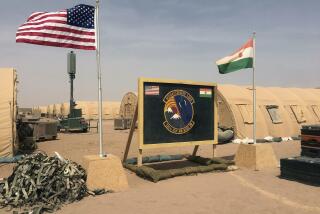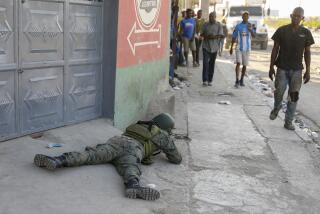Team in Liberia Sought Fast Aid
WASHINGTON â As Liberiaâs humanitarian crisis was approaching its peak this summer, the Pentagon quashed a report by its own team of specialists calling for an immediate U.S. intervention to stop the fighting and permit the delivery of emergency aid.
The Defense Department had sent a team of 31 military specialists to Liberia on July 7 âto make recommendations for an appropriate level of intervention,â according to the groupâs mission statement. After assessing the situation on the ground, the team completed its analysis and delivered it within 72 hours to Air Force One during President Bushâs Africa trip that week.
The team urged that the United States immediately deploy a 2,300-strong Marine Expeditionary Unit to stabilize the country and protect civilians amid a vicious civil war, said several U.S. officials familiar with the report. Instead, Bush sent a 200-member force into Liberia five weeks later and with a narrower mission.
On Air Force One, the initial draft of the teamâs report made the rounds of State Department and National Security Council officials, including national security advisor Condoleezza Rice, according to officials on the trip. The report was also distributed to top officials in the Armyâs European Command, which oversaw the team, and the Joint Chiefs of Staff.
But before the president saw the report, Pentagon officials pulled it back.
âThe Pentagon squashed it,â an administration official said. âIt was way too strong for their liking.â
Pentagon officials said the assessment team had exceeded its authority, and decided to sit on the report, several U.S. officials said. One defense official said the withdrawal of the report was âdefinitely strange.â Another called it âinconsistent with our operational procedures,â while denying that it was in any way âa coverup.â
The assessment teamâs superiors at the European Command told the group to rewrite the report, said another well-placed U.S. official who asked not to be named.
The revised report was filed on July 16, almost one week later, with a stronger humanitarian focus and less specific language over whether the U.S. should provide the emergency force or merely support a West African-led one.
âSecurity must be established so that humanitarian organizations can undertake an appropriate emergency response,â the revised report said, according to a copy obtained by The Times. âThe U.S. should provide and/or support a security force which will ensure safe access of NGO/IOs [nongovernmental organizations and international organizations] to needy populations and protect civilians from human rights violations.â
The teamâs initial assessment collided with Pentagon preferences.
âYou have to know your bossâ intent before you develop a plan that fits his intentions,â said a defense official, who asked not to be named. âNo one wants the perception of the U.S. being in the lead in Liberia.â
By the time seven a liaison team of U.S. Marines arrived in Monrovia, the shattered Liberian capital, on Aug. 6, more than 1,000 civilians and many more fighters had been killed and thousands of displaced people were suffering from starvation and disease.
A Pentagon spokesman said the conclusions of the Humanitarian Assistance Survey Team, which was headed by a Navy captain, were just one factor in deciding whether to go into Liberia.
Lawrence Di Rita, an aide to Defense Secretary Donald H. Rumsfeld and the departmentâs acting top spokesman, said the team had been assigned to âassess the situationâ but not to offer a recommendation on whether the White House should send troops.
âThey werenât asked to advise on a âgoâ or âno goâ decision,â he said.
The question of whether the United States should intervene militarily in Liberia went beyond disagreements within the Defense Department -- it has been the subject of a contest of wills between the State Department and the Pentagon.
State Department officials, including Secretary of State Colin L. Powell, argued that the United States needed to demonstrate leadership and commit troops to end a conflict that was destabilizing the entire region. But Pentagon officials strongly resisted, saying the military could not afford a risky and vague mission at a time when U.S. troops are spread thin around the world.
With the decision to send 200 U.S. Marines, who arrived in the country last week, the White House has found a sort of compromise between the two sides. Princeton N. Lyman, a veteran U.S. diplomat in Africa, said Bushâs decision should be regarded as a split verdict.
As the political tug of war played out over the summer, Liberians, aid groups and U.N. diplomats issued increasingly urgent appeals that the longer action was delayed, the worse the crisis would become.
In fact, soon after Bushâs Africa tour ended, Monrovia was engulfed in heavy fighting, transforming what would have been a clear-cut stabilizing operation into a potential combat mission, and the Pentagon deemed an intervention too risky rather than just politically unpalatable.
On July 25, the president ordered three U.S. ships carrying 2,300 Marines to steam toward Liberiaâs coast but did not commit any soldiers to go ashore. He had two conditions for putting U.S. boots on the ground: West African nations would have to take responsibility for their own backyard and deploy troops first, and President Charles Taylor would have to leave the country.
âPart of the thinking at the time was that if we go in first, weâll never see any African troops there,â a U.S. diplomat said.
At a news conference July 30, Bush said that if and when the U.S. sent forces, âthe troop strength will be limited, and the time frame will be limited.â
Nigerian President Olusegun Obasanjo dryly compared the U.S. offer of help to a fire brigade standing outside a burning house and using its hoses only after the fire was out. But he offered nearly 1,500 troops for a peacekeeping mission, and U.N. Secretary-General Kofi Annan arranged emergency U.N. funding while continuing to press Powell in almost daily phone calls for a quick U.S. commitment.
In the first week of August, the U.N. airlifted the first of a vanguard battalion of about 800 West African peacekeepers into Monrovia to help stop the fighting and secure a corridor for the delivery of aid. Rapturous Liberians, desperate for an end to the rebelsâ systematic rape and killing, lined the streets to cheer the West Africans.
âThat could have been American soldiers being celebrated across Monrovia,â a U.N. official said. âThis could have been an easy one for them.â
Robert Warwick, the International Rescue Committee relief groupâs West Africa director, agreed.
âThe U.S. squandered their opportunity,â he said. âThere was a moment when it seemed like all of the players, even the rebels, were willing and anxious for the U.S. to get involved. An earlier intervention would have stemmed the loss of more than a thousand lives from fighting and illnesses, and the looting of food and supplies.â
Now, he said, aid groups have had their supplies and equipment stolen, making it much more difficult to respond to an already dire humanitarian crisis.
After a key teleconference among Rumsfeld, Rice and the president last Sunday, followed by an urgent request from the commander of the African forces for backup, Bush sent 200 Marines on shore Thursday in that supporting role.
The Marinesâ mission is to help the Nigerian troops secure the port and provide support in case of an attack on the peacekeepers. But âa great numberâ returned to their ships Thursday night, a Pentagon spokesman said Friday, and would go ashore only on an ad hoc basis.
After a Security Council briefing Thursday on the situation in Liberia, a senior U.N. official pressed once again for greater U.S. involvement.
âTwo hundred soldiers is still not enough. The more they send, and the longer they stay, the better,â he said. âIt will have a tremendous effect on changing the security atmosphere in Liberia and encouraging other countries to contribute troops. And that will make it easier for everyone.â
Annan and peacekeeping officials have cautioned that a fresh contingent of U.N. troops is unlikely to be able to take over by the Oct. 1 deadline the U.S. has demanded, raising the question of whether American forces will need to stay longer -- and risk becoming mired in the very long-term involvement Pentagon officials were concerned about.
âWe want to see what we can do to help them get started,â and then as more multinational forces come in, the U.S. troops will be scaled back, Pentagon spokesman Di Rita said last week. âBut the objective hasnât changed, and itâs important to understand it.â
*
Farley reported from the United Nations, Simmons from Monrovia and Richter from Washington.
More to Read
Sign up for Essential California
The most important California stories and recommendations in your inbox every morning.
You may occasionally receive promotional content from the Los Angeles Times.











